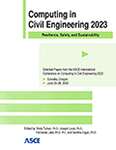Evaluation of Hospital Pandemic Response Decisions to Design for Operational Flexibility
Publication: Computing in Civil Engineering 2023
ABSTRACT
Hospitals across the world have been significantly impacted by the novel COVID-19 pandemic, which has required incident commanders (hospital decision-makers) to make changes to the hospital such as opening and closing wards, changing screening protocols, reducing or canceling elective procedures, using temporary treatment spaces, etc. These changes impacted the relationships between the spaces within the hospitals. This study used the graph theoretical approach (GTA) optimization technique to analyze the impact of these changes during a surge event such as the COVID-19 pandemic. In particular, the study is interested in how these changes impacted the relationships between the various departments and areas within the hospital facility layout. In both cases, the layout created with surge data outperformed the layout created with normal conditions. This research provides insight into the impact of layout on operations and provides recommendations on how hospital facilities can be designed/modeled for flexibility in future surge events.
Get full access to this article
View all available purchase options and get full access to this chapter.
REFERENCES
Anjos, M. F., and Vieira, M. V. C. (2017). “Mathematical optimization approaches for facility layout problems: The state-of-the-art and future research directions.” Eur. J. Oper. Res. 261 (1): 1–16.
Arnolds, I., and Nickel, S. (2015). “Layout planning problems in health care.” In Applications of location analysis: International series in operations research and management science, edited by H. A. Eiselt and V. Marianov, Cham, Switzerland: Springer. 109–152.
Assem, M., Ouda, B. K., and Wahed, M. A. (2012). “Improving operating theatre design using facilities layout planning.” In Proc., 2012 Cairo Int. Biomedical Engineering Conf. (CIBEC), New York: IEEE. 109–113.
Brüggemann, S., Chan, T., Wardi, G., Mandel, J., Fontanesi, J., and Bitmead, R. (2021). Decision support tool for hospital resource allocation during the COVID-19 pandemic. Informatics in Medicine Unlocked, 100618.
Capolongo, S., Gola, M., Brambilla, A., Morganti, A., Mosca, E. I., and Barach, P. (2020). COVID-19 and healthcare facilities: a decalogue of design strategies for resilient hospitals. Acta Bio Medica: Atenei Parmensis, 91(9-S), 50.
Christen, P., D’Aeth, J. C., Løchen, A., McCabe, R., Rizmie, D., Schmit, N., and Hauck, K. (2021). The J-IDEA pandemic planner: a framework for implementing hospital provision interventions during the COVID-19 pandemic. Medical care, 59(5), 371.
Elshafei, A. N. (1977). “Hospital layout as a quadratic assignment problem.” J. Oper. Res. Soc. 28 (1): 167–179.
Foulds, L. R., and Robinson, D. F. (1978). “Graph theoretic heuristics for the plant layout problem.” Int. J. Prod. Res. 16 (1): 27–37.
Francis, R. L., McGinnis, L. F., and White, J. A. (1992). Facility layout and location: An analytical approach. Englewood Cliffs, NJ: Prentice Hall.
Lather, J. I., Logan, T., Renner, K., and Messner, J. I. (2020). Implementation and evaluation of generative layout options using the graph theoretical approach for a hospital layout problem. Journal of Computing in Civil Engineering, 34(4), 04020014.
Malmborg, C. J. (1994). “Facility design: The block layout planning process for manufacturing systems.” In Handbook of design, manufacturing and automation, 461–479. Hoboken, NJ: Wiley.
McCabe, R., Schmit, N., Christen, P., D’Aeth, J. C., Løchen, A., Rizmie, D., and Hauck, K. (2020). Adapting hospital capacity to meet changing demands during the COVID-19 pandemic. BMC medicine, 18(1), 1–12.
Rees, E. M., Nightingale, E. S., Jafari, Y., Waterlow, N. R., Clifford, S., Pearson, C. A., and CMMID Working Group. (2020). COVID-19 length of hospital stay: a systematic review and data synthesis. BMC medicine, 18(1), 1–22.
Teran-Somohano, A., and Smith, A. E. (2023). A sequential space syntax approach for healthcare facility layout design. Computers & Industrial Engineering, 177, 109038.
Ulrich, R. S., Zimring, C., Barch, X. Z., Dubose, J., Seo, H.-B., Choi, Y.-S., and Joseph, A. (2008). A review of the research literature on evidence-based healthcare design. HERD: Health Environments Research & Design Journal, 1(3), 61–125.
Vincent, J. L., and Creteur, J. (2020). Ethical aspects of the COVID-19 crisis: How to deal with an overwhelming shortage of acute beds. European Heart Journal: Acute Cardiovascular Care, 9(3), 248–252.
Wallace, C. L., Wladkowski, S. P., Gibson, A., and White, P. (2020). Grief during the COVID-19 pandemic: considerations for palliative care providers. Journal of pain and symptom management, 60(1), e70–e76.
Information & Authors
Information
Published In
History
Published online: Jan 25, 2024
ASCE Technical Topics:
- Aerospace engineering
- Building design
- Buildings
- Business management
- Decision making
- Design (by type)
- Engineering fundamentals
- Epidemic and pandemic
- Facilities (by type)
- Health care facilities
- Practice and Profession
- Public administration
- Public health and safety
- Space exploration
- Structural engineering
- Structures (by type)
- Sustainable development
Authors
Metrics & Citations
Metrics
Citations
Download citation
If you have the appropriate software installed, you can download article citation data to the citation manager of your choice. Simply select your manager software from the list below and click Download.
